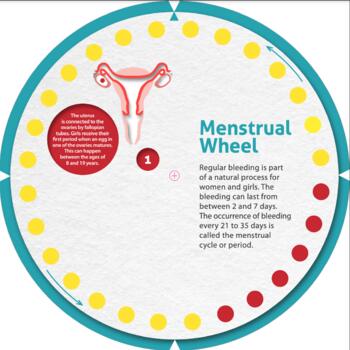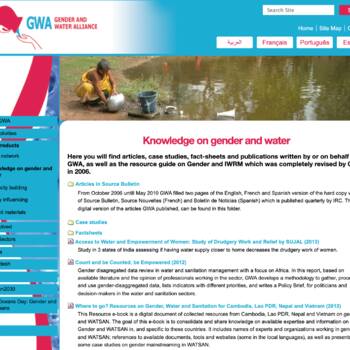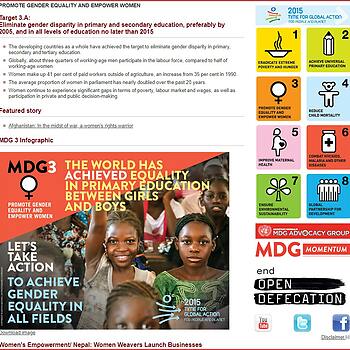The Millennium Development Goals (MDGs) were eight international development goals for the year 2015 that had been established following the Millennium Summit of the United Nations in 2000, following the adoption of the United Nations Millennium Declaration. All 191 United Nations member states, and many international organizations, were committed to help achieve the MDGs. MDG 3 and MDG7 were relevant in the context of gender and water:
MDG3: To promote gender equality and empower women, with as indicators:
- Ratios of girls to boys in primary, secondary and tertiary education
- Share of women in wage employment in the non-agricultural sector
- Proportion of seats held by women in national parliament
MDG7: To ensure environmental sustainability, with target 7C: Halve, by 2015, the proportion of the population without sustainable access to safe drinking water and basic sanitation, with as indicators.
- Proportion of population with sustainable access to an improved water source, urban and rural
- Proportion of urban population with access to improved sanitation
The above indicators did not explicitly link gender equality to equal access to water, however, improved access to drinking water and sanitation often goes hand-in-hand with reducing women’s unequal domestic work load and/or improving their health and well-being.
Relevant MGD3 achievements
- An increase in the number of girls in school in 2015 compared to 2000. The developing world as a whole has achieved the goal of eliminating gender disparity in all levels of education, including primary, secondary, and tertiary.
- In Southern Asia, the number of girls enrolled in primary school was 74 for every 100 boys in 1990. By 2015, there were 103 girls enrolled for every 100 boys.
- Significant gains in women’s parliamentary representation in nearly 90 percent of 174 countries for which data were available. At the very least, the average proportion of women in parliament has increased by nearly 100 percent, yet this still translates to one woman for every five men.
Relevant MDG7 (target 7C) achievements
- The number of people using improved drinking water sources has increased from 76 percent in 1990 to 91 percent in 2015.
- 2.6 billion people have gained access to better drinking water since 1990. Of these, 1.9 billion have access to piped drinking water on premises, with 58 percent of the global population enjoying this level of service in 2015.
- 2.1 billion people in the universe have gained access to improved sanitation. At the same time, the proportion of people practising open defecation has reduced by nearly 50 percent since 1990.
Sources and further reading
2000: Millennium Development Goals established, including MDG3 (on gender equality) and MDG7 on water and sanitation.
2000: Second World Water Forum and Ministerial Conference in The Hague. During this conference the Gender and Water Alliance (GWA) was launched by GWP and IRC, replacing GenNET, with IRC initially as the secretariat.
2000: Menstrual Wheel poster by WSS (A09135) – interesting as explicit attention to menstruation by an organisation working on Water Supply and Sanitation, see Menstrual Wheel Poster.pdf
2002: “The gender approach to Water Management” by GWA (A05832 in NICC collection). Thereafter many more GWA publications on gender and water were published, usually together with others, such as UNDP and WSS, and addressing both WASH and IWRM, overtime as well issues as gender and climate change.
See website Gender and Water and A00633, A08575, A09082, A09083, A09084 and A09394 in the NICC-collection.
2004: Women for Water Partnership (WfWP) established, initially as a network organisation with the Netherlands Women’s Council (NVR) as secretariat, since 20.. as an organisation with an own legal status. Check jaartallen!


